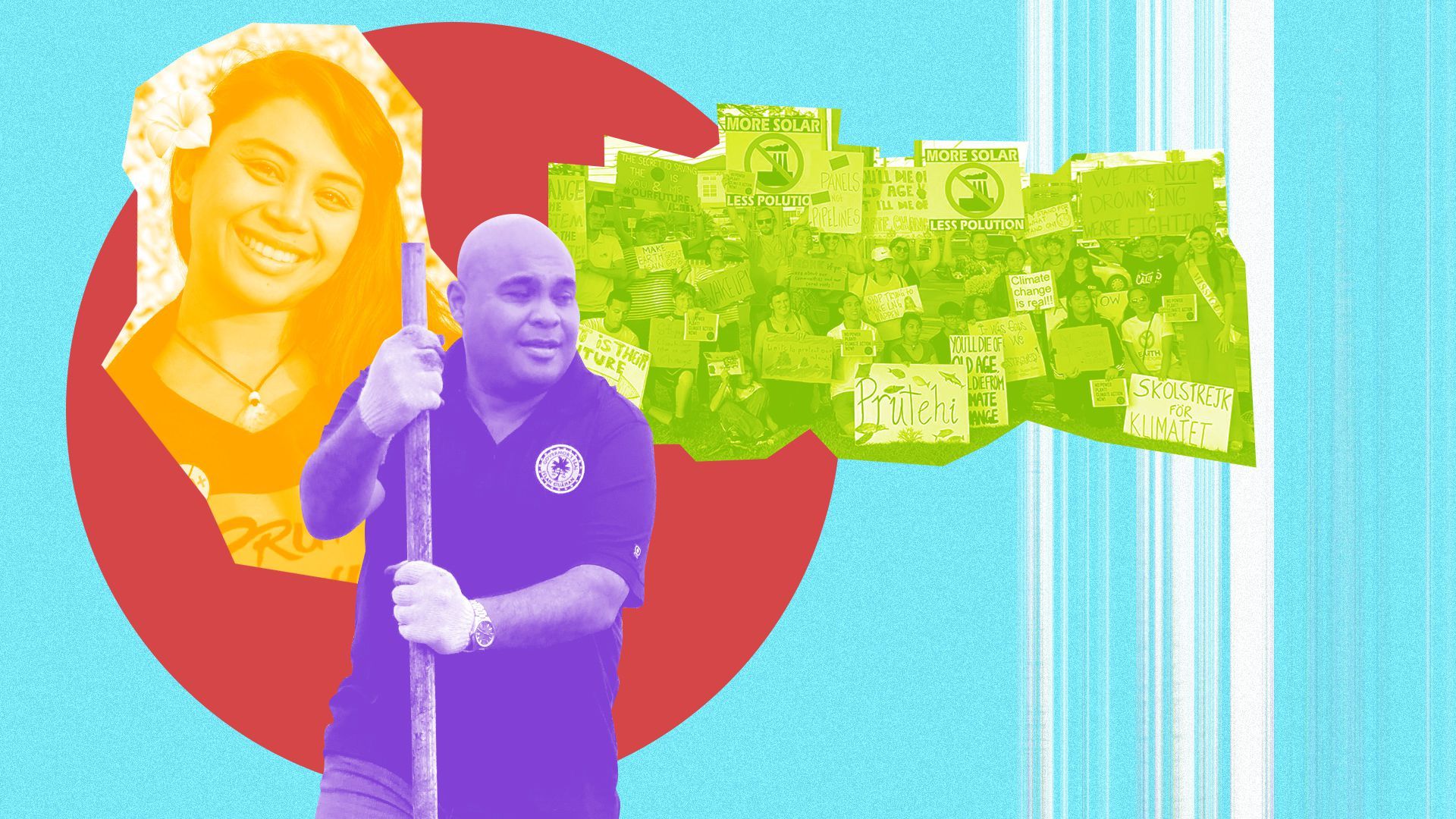Facing existential threat from climate change, Pacific Islanders urge world to listen
Add Axios as your preferred source to
see more of our stories on Google.

Climate organizer Moñeka De Oro (left), Guam Lt. Gov. Josh Tenorio and Micronesia Climate Change Alliance. Photo illustration: Aïda Amer/Axios. Photos: Courtesy of MCCA and the University of Guam Center for Island Sustainability
Decades after Pacific Islanders first raised the alarm, the rest of the world is finally catching up: The climate crisis is here, and it's accelerating.
Why it matters: Pacific Islanders, whose nations face an existential threat from climate change, were a major force behind the Paris Agreement. Heading into November's UN climate summit, they are calling for greater urgency in meeting the goals of the accord, and more direct action from world leaders — especially President Biden.
State of play: Pacific Islanders have suffered some of the world's most serious climate impacts to date, with sea level rise caused by the burning of fossil fuels posing an existential risk. Additionally, the legacy of toxic pollution from nuclear tests and waste facilities haunts some of these island nations.
- In the Pacific, sea levels are rising at faster rates than projected, according to the U.S. Geological Service. Some islands have already been swallowed by the sea.
- Island nations like the Republic of the Marshall Islands (RMI) — where the U.S. has dumped massive amounts of nuclear waste — are considering relocating their citizens or building an elevated island. By 2030, "we’re expected to be underwater," then-RMI President Hilda Heine said in 2019. "It is the very existence of the Marshall Islands that’s at stake."
- On Guam, U.S. defense activities have elevated health and environmental risks, according to its Indigenous community. Three UN Special Rapporteurs backed their concerns in a January letter to Biden, calling U.S. actions a human rights violation.
- The Japanese government's plans to discharge 1.25 million tons of contaminated nuclear wastewater into the Pacific Ocean have drawn protests from Pacific Islanders.
With the crises taking on new urgency, Pacific Island nations and activists have repeatedly pushed for a bigger seat at the table, especially with the U.S.
- Though Biden’s election gave them hope, his climate plan fails to center the hardest-hit Indigenous communities, said Moñeka De Oro, a Chamoru climate organizer based in Guam and the Northern Mariana Islands.
- Island nations were further disappointed when RMI was the only Pacific voice among the 40 nations invited to Biden's May climate summit, Samoa News reports.
- It's unclear if Biden has responded to the UN rapporteurs' letter. The White House did not respond to Axios' request for comment.
What they're saying: "It's very difficult and still frustrating that at the end of the day, 'national security' trumps our rights," De Oro told Axios, referring to self-determination and the island territories' inability to fully govern themselves.
- That inability is costly — especially when climate change is actually the greatest threat to national security, De Oro argued.
- Guam Lt. Gov. Josh Tenorio (D) said "as indigenous people, we have called these islands home for thousands of years. We know the changes we are seeing are not normal."
- He called on world leaders, as they "witness climate disasters in their backyard," to consider "how much worse it has been for islands on the frontlines."
The big picture: Indigenous people comprise less than 5% of the world's population but protect 80% of global biodiversity, National Geographic reports.
- De Oro's Micronesia Climate Chance Alliance has led that charge with campaigns against illegal waste dumping, food security resources and Indigenous flower-weaving fundraisers for community-based solutions.
- Though Pacific Islanders need support from the U.S. "to address environmental injustices and ensure a sustainable future for our islands," Tenorio said they are not waiting around.
- Governments across the Pacific have collaborated on initiatives like the Micronesia Challenge, which was established in 2006 to manage marine and terrestrial resources.
The bottom line: "Pacific Islanders innately know how to work together and how to share resources and how to survive with very little ... in very hostile environments," De Oro said.
- "That's a wisdom we can share with the rest of the world, if they care to listen."
